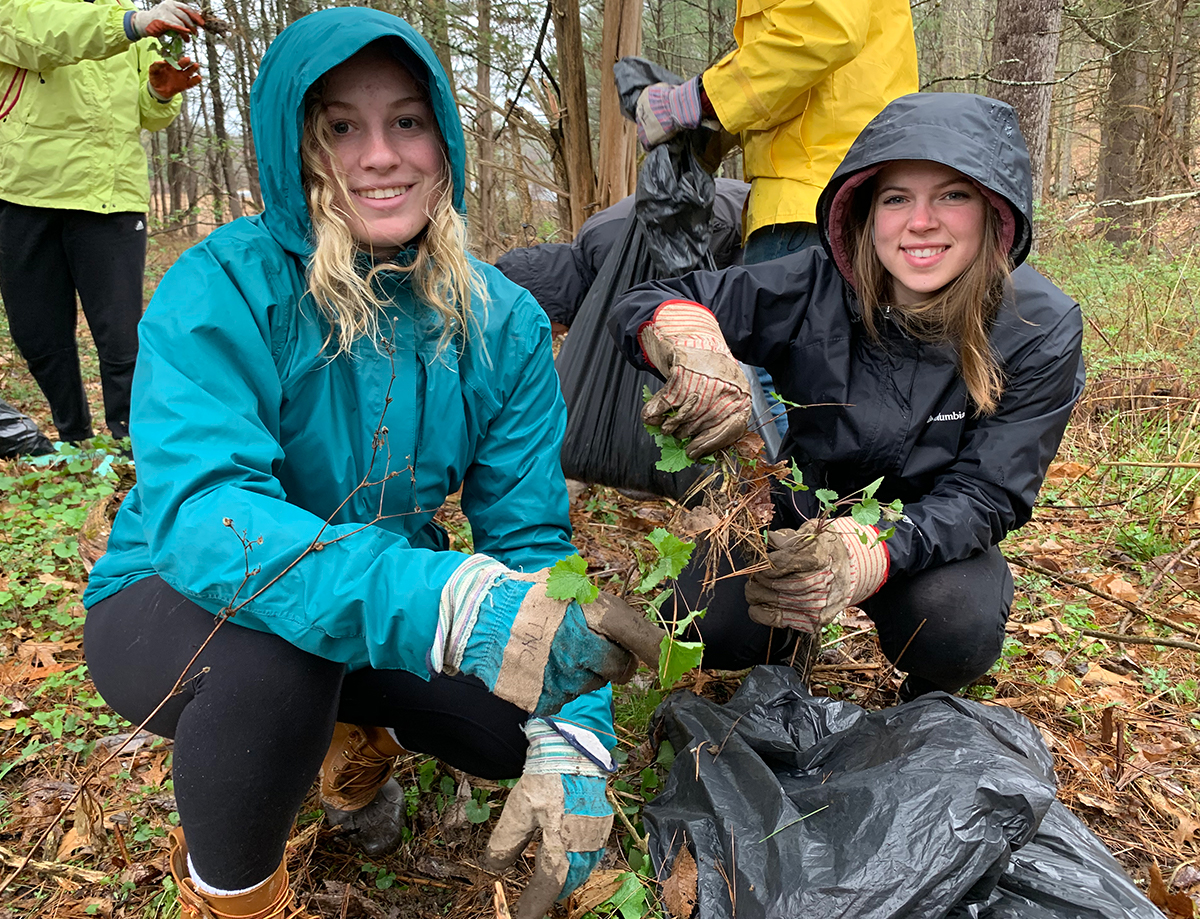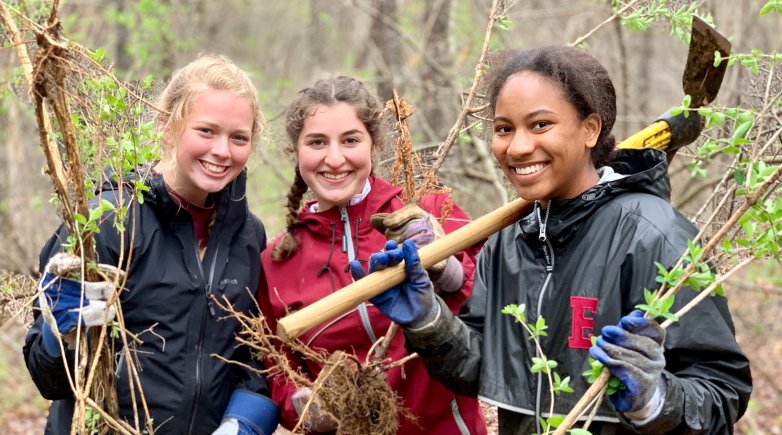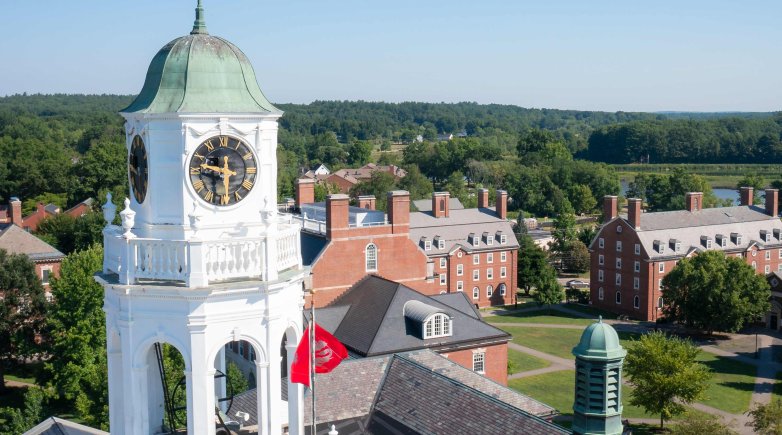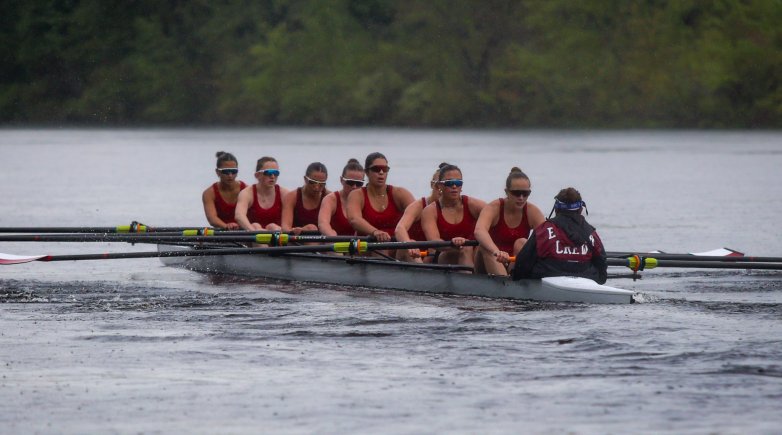Climate Action Day: Exeter renews the fight
PEA celebrates its commitment to environmental activism.
Addison Luce '21, Rachel Saltman '21 and Marymegan Wright '21 show off the fruits of their labor culling invasives from Southeast Land Trust property in Exeter.
Exeter has met the enemy, and it is garlic mustard.
A platoon of students fanned out Friday morning on the front lines of the fight against the delicious-but-diabolical invasive species, making one small and very local contribution in the global combat against climate change.
The weed-plucking at Lubberland Creek Preserve in Newmarket was one of dozens of activities that filled the agenda of the school’s fifth annual Climate Action Day. From planting dune grass on the seacoast, to sifting through the garbage collected from various Academy buildings, to learning about the implications of the food we eat, the day’s activities were intended to underscore each Exonian’s part in understanding and meeting the challenges to the environment.
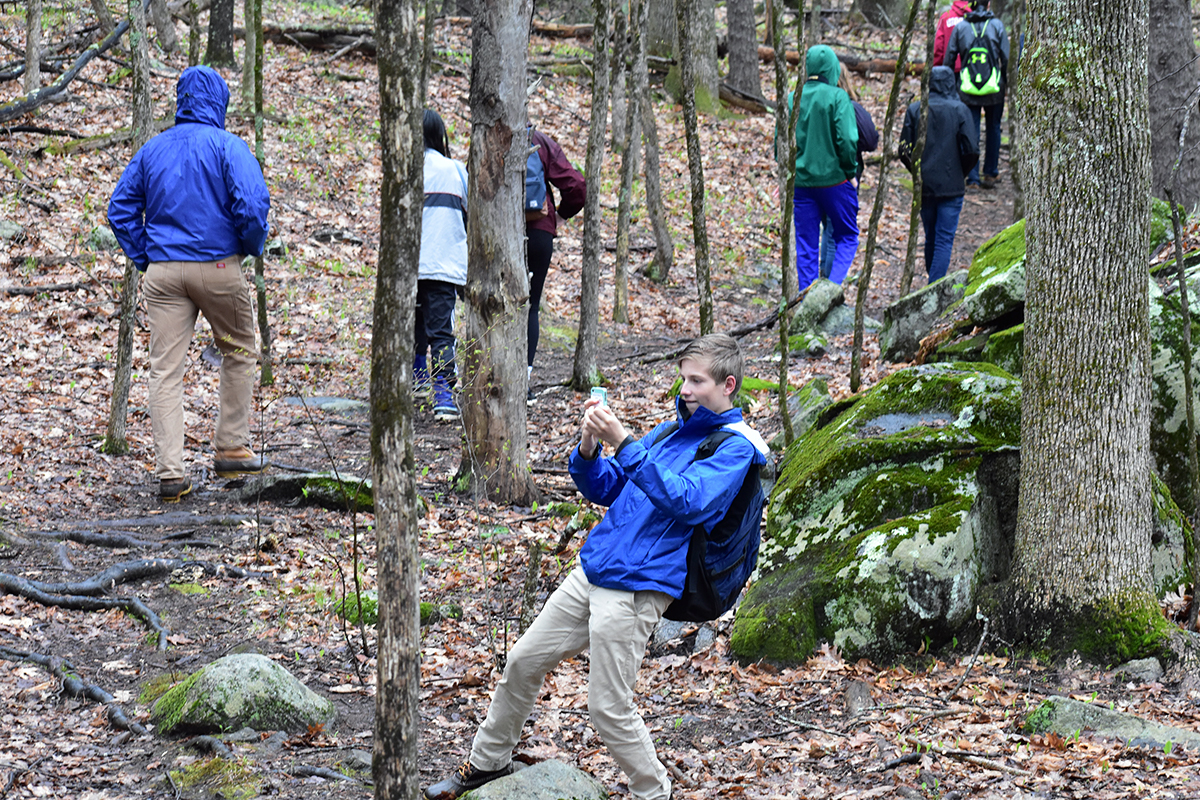
“We all have a role to play,” said Principal Bill Rawson at the day’s opening assembly. “I challenge you not just to think of (climate change) as something others are doing to us, but something we’re doing to ourselves and our own planet.”
Rawson noted to the Assembly Hall audience he was wearing a jacket and tie, “an old-fashioned way of signifying the importance of the day” — one of just three days throughout the school calendar dedicated to a singular topic.
“Time is a very precious commodity at Exeter. How we use time says a lot about who we are and our values as a community. And we are going to spend a whole day on environmental issues.”
A warning on warming
Rawson’s remarks and an original slam poem by Elizabeth Kostina ’20 — “If aliens land, will they think we worship plastic as a deity?” — preceded the day’s keynote speaker, Ko Barrett, to the stage. Barrett is the vice chair of the Intergovernmental Panel on Climate Change, the United Nations body for assessing the science related to global changes to the climate — what’s happening and why.
Her appearance at Exeter comes six months after the IPCC delivered “The Special Report on Global Warming of 1.5 °C,” a report prepared by 91 authors from 40 countries over the course of 2 ½ years. Its key message is that containing planetary warming to 1.5 °C (2.7 °F) above pre-industrial levels is feasible, but would require, according to Barrett, changes to carbon emissions “on an unprecedented scale … fundamental behavioral change.”
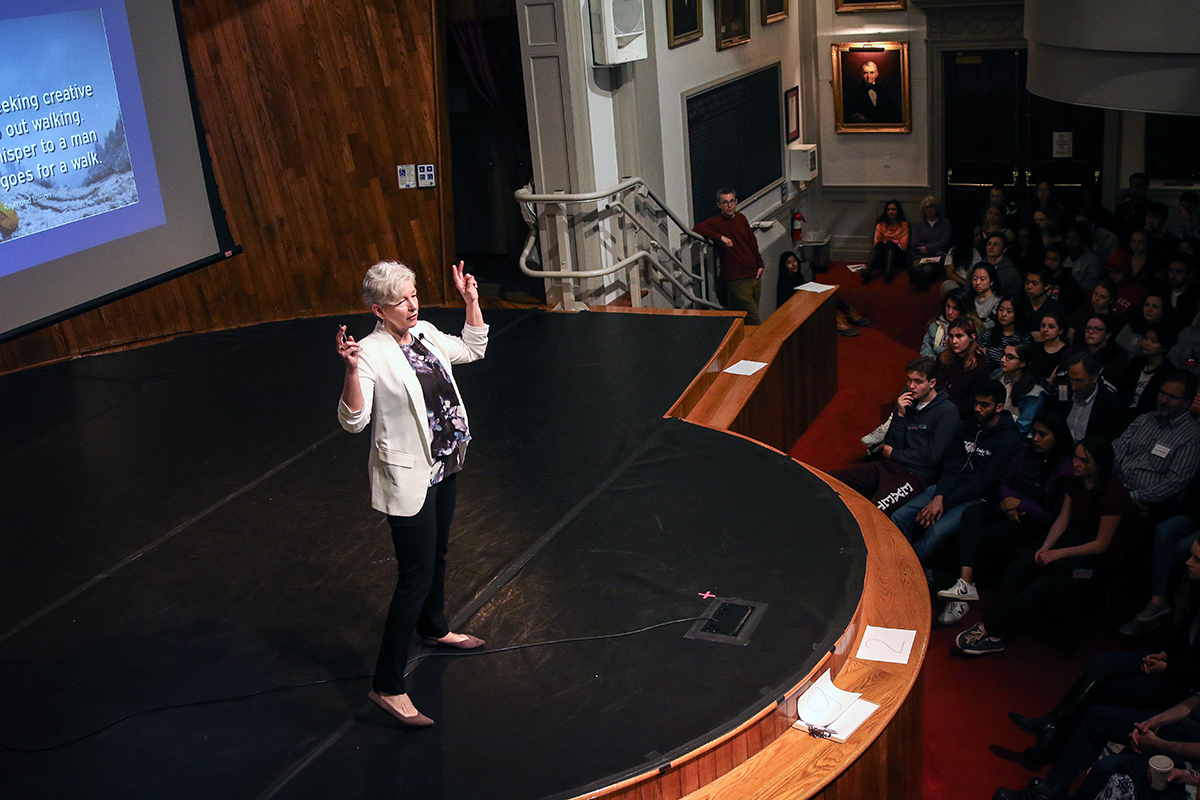
The alternative? A rise in warming of 2 °C and above, a result with the potentially catastrophic impacts of extreme weather, rising sea levels, diminishing Arctic sea ice, coral bleaching and loss of ecosystems.
Barrett said the sobering report has generated 25,000 media hits, largely, she says, because the findings spoke not in generalities about future generations but about “specific examples about what’s likely to happen in the near term.” Whether it serves as a wake-up call heeded remains to be seen, but Barrett hasn’t given up hope.
“I’m an optimist. I’ve been working on climate for 20 years,” she said. “If I wasn’t an optimist, I’d be doing something else.”
A star in the making
Environmentalism was just gathering steam when Chris Case ’74 was an Exeter student. The Endangered Species Act, the Stockholm Declaration — the first document in international environmental law to recognize the right to a healthy environment — and the influential book A Blueprint for Survival each came into being during Case’s time at PEA. Forty-five years later, Case is focused on a core environmental issue of the day: Energy generation.
Case’s bright idea: Harnessing the sun’s power via lower-cost, more-efficient solar cells. As chief technology officer at Oxford Photovoltaics, he is leading the development of the thin-film cells that can be applied to the facades of glass buildings. Case, one of eight alumni who returned to campus to present at this year’s Climate Action Day, describes this potential breakthrough as a type of “disruptive technology” being met with resistance from current suppliers of energy resources. He contends, however, that reliance on the sun’s power is inevitable on a planet that has surpassed peak levels of fossil fuels.
“The reserves left of oil and gas can be measured in just hundreds of years, whereas the Sun offers us at least another 23,000 years of energy," Case said.
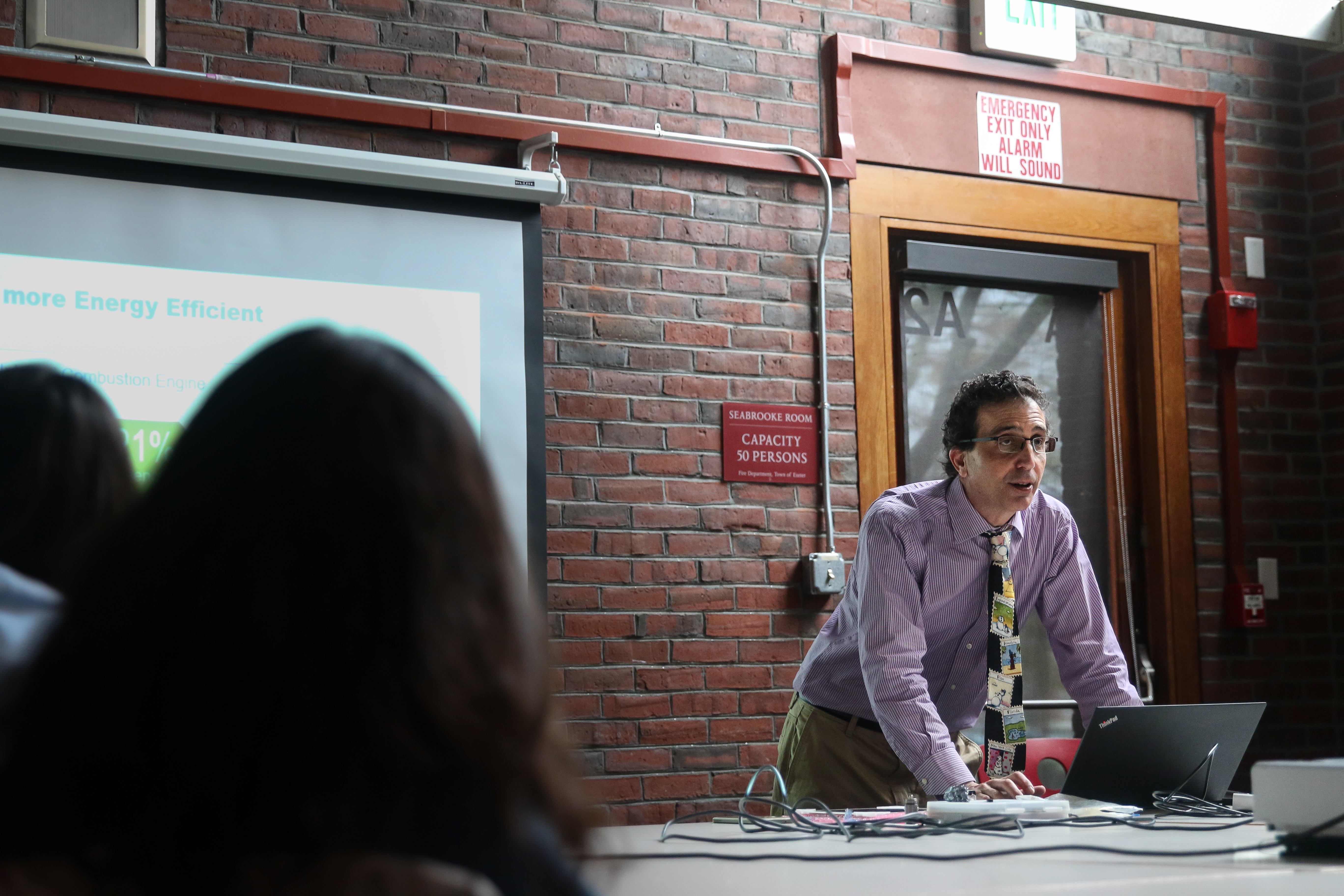
Finding solutions upstream
Plastic drinking straws have long been a staple of the food-service industry, but people like Keith Tharp of Sustainable Seacoast see these ubiquitous utensils as a microcosm of the larger single-use plastic epidemic in this country and around the world. Speaking to Exonians in the Elting Room of Phillips Hall, Tharp outlined his organization’s efforts to work with restaurants and event spaces in Portsmouth and the surrounding communities to provide patrons with alternatives to single-use plastics. “We’re trying to move the solutions upstream, to the restaurant owners, rather than asking the customers to say 'skip the straw',” he said.
In addition to straws, Tharp also touched on other single-use items common to everyday life that have more eco-friendly alternatives like replacing plastic shopping bags with reusable bags and avoiding Styrofoam food containers and plastic water bottles entirely. He referenced a recent partnership between his organization and The Music Hall of Portsmouth in which the performance venue eliminated the sale of bottled water, instead opting for a draft system that featured filtered tap for improved taste and the option to add carbonation while also providing patrons with reusable cups.
“Now people are more than happy to spend $3 for a cup of water that tastes better than what you would get out of the tap, but are also not contributing to single-use plastic bottles going into our environment,” Tharp said.
Tharp has been encouraged by the activism of the some of the youngest members of the Seacoast community, such as a group of sixth-graders in Stratham who petitioned their school leadership to eliminate the plastic utensils they were eating with on a daily basis and instead switch to metal flatware.
“These kids were not accepting that they didn’t have a say in things,” he said.
The double bottom line
Ground cricket flour, lab-grown meat and algae chips were just a few of the forward-thinking items on the “menu” during alum Peter Grubstein’s Climate Action Day workshop.
As a vegan, active environmentalist and socially responsible investor, Grubstein ’73 spoke about how his career is both a reflection of his values and a furthering of them. “I realized a long time ago you can influence the environment in very serious ways with your investing,” he said. As founder of N*GEN Partners, Grubstein provides early-stage financing for ventures — including hydroponic greenhouses, all-natural drinks and renewable, solar energy initiatives — that make both a positive impact and healthy return. It’s the sweet spot of the double bottom line.
To the 25 students and faculty gathered in the Library Commons, he stressed the power of choice and agency: “These are choices you are making. You can’t blame the industries for environmental demise. It’s your plastic cups, your plastic ear buds. …You have much more power as an individual than you think. …. Remember, the present is owned by the future and you are just borrowing from it.”
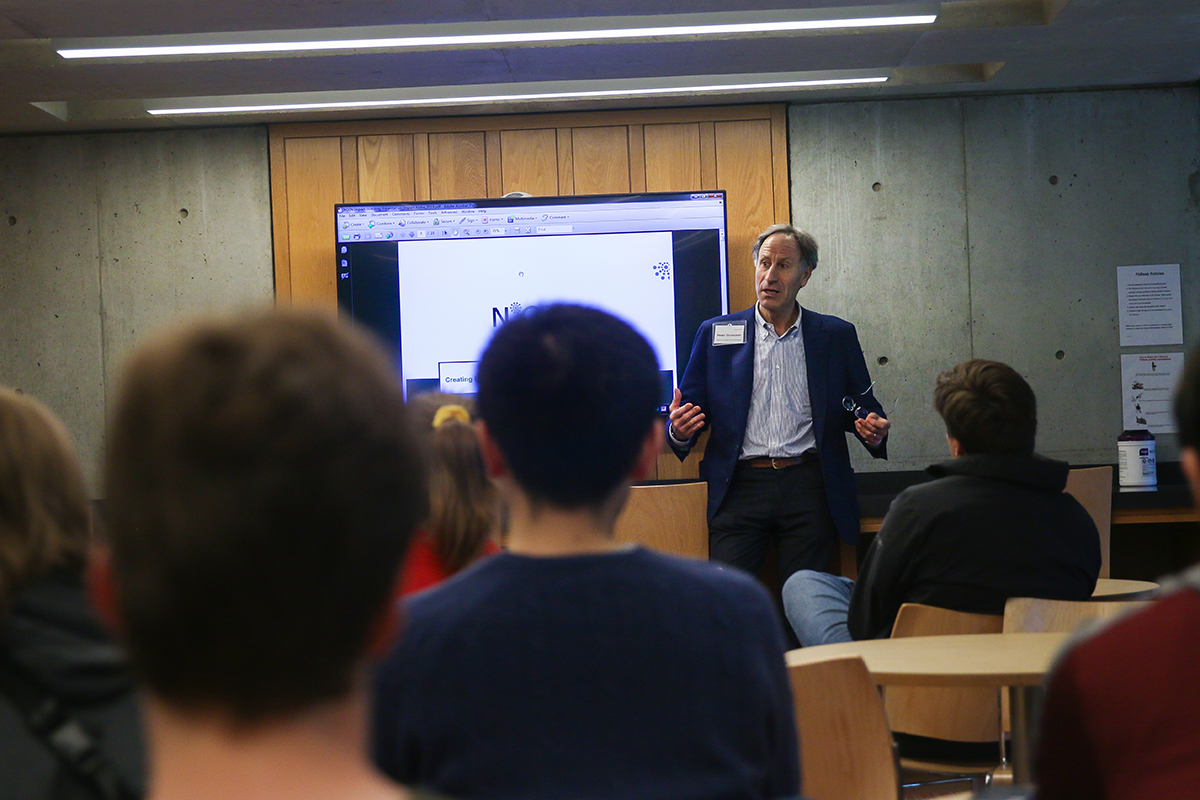
Getting on board with electric buses
Kate Tomford ’95 spoke to students and faculty in the Gillepsie Room about her role in the Chicago Transit Authority’s efforts to replace its diesel engine buses with electric buses over the course of the next two decades. A finance department senior analyst, Tomford outlined the strategy and challenges of the mass transit agency’s stated objective of making Chicago’s city bus fleet entirely electric by the year 2040.
“The trains are all electric so we’re all good there, but our buses run on diesel,” she said. “We have a lot of emissions from our bus system.”
Tomford found her way into the municipal transportation sector after spending seven years working in state government for former Illinois Governor Pat Quinn, where she devoted her focus to energy policy. Now in her fourth year at the Chicago Transit Authority, Tomford and her colleagues oversee rail and bus service for the country’s third largest city, managing 1,860 buses and 1,500 railcars and accommodating nearly 1.5 million rides per day. With such a substantial ridership, Tomford recognized early in her tenure that a progressive, eco-friendly strategy was imperative.
“When I came to the CTA, it became clear that electric buses are really the way that all transit agencies are starting to go now because everyone is making an effort to reduce carbon emissions,” she said.
Tomford discussed the financial investments cities like Chicago are making as they transition from diesel to electric buses, setting the price tag for the purchase of a single electric bus at $900,000, roughly $400,000 more than a diesel bus, with charging station costs ranging from $100,000 to $4 million. In addition to the increased costs associated with electric buses, Tomford also discussed the city planning that goes into making accommodations for charging stations along bus routes.
“You have to have 100 feet of straight curb,” Tomford said talking about a method of charging that involves an overhead docking system. “There aren’t a lot of terminals for our bus routes that have that straightaway.”
Students were asked to provide examples of ways that Exeter could incorporate more electric vehicle use for academy related activities. One suggestion was to seek out transportation companies with electric vehicle options for travel to away sporting events and for airport shuttles.
